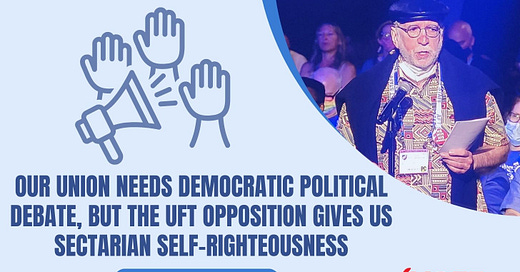Our Union Needs Democratic Political Debate, But the UFT Opposition Gives Us Sectarian Self-Righteousness
Recently, I wrote about my political history in the UFT on the Unity Substack. As a new teacher who had political differences with Al Shanker, I ran on the New Action slate in my first UFT election. But the more I became involved in the UFT, the more I found the UFT opposition wanting, a party of ‘no’ with little vision and even less accomplishment. To make a difference on the matters that were important to me – the empowerment and professional autonomy of educators, the education and well-being of my inner city students, civil and human rights, and the common good of working people – I joined the Unity Caucus. The reasons for my change are relevant, I argued, for the choices the UFT faces today in the coming elections.
In response to my intervention, Michael Shulman, the long-time New Action leader and ARISE candidate for UFT Secretary, took to the New Action website. One would expect a leader of the opposition to take issue with my argument, but Shulman went well beyond such criticism, and impugned the integrity and honesty of all Unity leaders, union staff, and rank-and-file activists. The title of his broadside sums up his argument, such as it is: “Leaving Your Conscience and Principles at the Front Door.”
While it is generally a sound rule to ignore ad hominem arguments, there are important reasons to make an exception in this case. Written by the opposition candidate for the number two position in the UFT, Shulman’s piece provides a revealing window into how the opposition often conducts itself in debates inside the UFT, and highlights an important truth about it that needs underlining. The UFT opposition continually engages in the extreme, denunciatory rhetoric of left sectarianism, characterizing Unity and its members not as political opponents with whom it disagrees on important questions, but as a malignant force – morally corrupt, intellectually dishonest, and politically unprincipled.
At a time when anti-incumbent sentiment is so strong worldwide, the opposition appears to be calculating that such denunciations and sectarian rhetoric can bring it victory in the UFT. But there are consequences for democracy when you demonize your political opponents, as we can see so plainly in our national politics. The opposition’s resort to such tactics debases and degrades political life inside the UFT, and undermines the democratic political culture our union needs and deserves. And democratic political cultures are much easier to destroy than to rebuild.
In a healthy and democratic political culture, different political caucuses in the UFT would put forward their ideas on how to best advance the interests of its members and the welfare of the students and communities we educate, care for, and serve. We would debate our differences over approaches to policy, organizing, and political action, such as which candidates to endorse (and not endorse), how to increase para pay, how to diminish the influence of standardized exams on education, how to equalize pension tiers, how to achieve universal health insurance, and how to reduce class size. Since Unity is the incumbent caucus, its record – the strength of its leadership, what it has achieved in office, and what it could be reasonably expected to achieve if it was re-elected – would be an important focus of debate.
Read Shulman’s piece Leaving Your Conscience and Principles at the Front Door: A Response to Unity’s Leo Casey (the New Action website was down at time of posting). He avoids linking to my original post, as if he fears his readers might compare his characterizations and what I actually wrote; I urge readers to contrast the two arguments.) Are there any signs of democratic political discourse in what Shulman writes? None that I can find. Like a crude medieval morality play, Shulman’s world is divided between the forces of evil – the unprincipled, corrupt Unity Caucus – and the forces of good – the morally pure, righteous opposition of New Action and ARISE. In his world, Unity Caucus activists can’t be fellow unionists with whom he has political differences that are democratically debated and decided in union elections and deliberative bodies; they have to be “apologists” and blind “loyalists” who, without honor or integrity, engage in an endless series of “sell-outs” and acts of betrayal. If, like me, you left the opposition and joined Unity out of a desire to make actual change, you can only be a renegade and an apostate, a person who leaves his “conscience and principles at the front door.”
In this self-righteous world of the sectarian, there are no mistakes, no errors of judgment. The UFT opposition cannot make a mistake, because its motives and intentions are always noble and pure. And Unity cannot make a mistake, because its motives are always malign; when a Unity decision turns out to be in error, it can only be because Unity had always intended to betray the union and sell-out its members. That is why, I suppose, Shulman takes such exception to my description of an event that played a pivotal role in my decision to change political affiliations in the union: the UFT’s initial failure to address a severe environmental crisis in the high school in which I first taught, Clara Barton HS. As I recounted in my original post, our UFT Chapter had reached out for help to both Shulman, who was then our Vice President, and our District Representative, who was from Unity, but to no avail: the hazards continued, unabated, and only grew worse. After some time, I was forced to go outside of the UFT to obtain a court order to have the school tested for asbestos contamination, and then closed down for months for a full clean-up and asbestos abatement. The thought that not only had he and New Action erred, but that he had made the very same error of inaction as Unity, was too much to bear for Shulman. But his post’s self-apologia fails on two counts: First, there are a legion of UFTers who worked in Clara Barton during our asbestos crisis and will confirm my account of what happened. And secondly, even Shulman’s excuse, if it is true – that he had handed off the issue to someone then working as a consultant for the union – falls far short of what UFTers have a right to expect of their officers: when members are in serious need, and so long as they are in that state of need, their elected UFT leadership should be their most outspoken advocates. That was my philosophy, when I was elected to the same office of Vice President from Academic High Schools that Shulman then held.
There is a curious gap in Shulman’s long train of supposed acts of perfidy by Unity and righteousness on the part of the opposition. This lacuna covers the extended period of time in which New Action, under his leadership, entered into an electoral alliance with Unity: for a number of election cycles, Shulman and New Action cross-endorsed the Unity candidate for UFT President, first Randi Weingarten and then Michael Mulgrew, while Unity cross-endorsed a small number of New Action candidates for the UFT Executive Board. If even a fraction of what he now says about Unity were true, it is hard to understand how Shulman could justify entering into such an arrangement. So far as I am aware, he has never offered a public explanation for what – if you believe the extreme sectarian rhetoric he indulges – had to be a most significant error of judgment by himself and his caucus, played out over many years.
(For my part, I understood why Unity leadership thought there might be value in a ‘united front’ of different union caucuses during the challenging Bloomberg-Klein years. I was skeptical, however, that an alliance with a small caucus made up almost entirely of retirees would deliver the desired effect, and that skepticism was borne out over time. But I also believe that we all make political errors of judgment, at one point or another. It’s just that some of us admit our mistakes and work to fix them, while others pretend that they never err because they alone are righteous and pure.)
There is a belief that those most injured by denunciatory, sectarian rhetoric are the targeted individuals. In my view, this is a misplaced concern. I have no fear that those who have worked side-by-side with me in the UFT and AFT for over four decades, or who read what I have written on teacher unionism, education, and democracy, will come away from Shulman’s post convinced that I leave my “conscience and principles at the front door.” The real damage here is to our union, which needs robust democratic political debate, focused on issues and plans for the future. And we need that democratic political culture now more than ever: we are facing the greatest challenge of our lifetimes in a Trump administration that views unions and public education as two of the main obstacles to its autocratic rule. Denunciatory, sectarian rhetoric is poison to that democratic culture.






